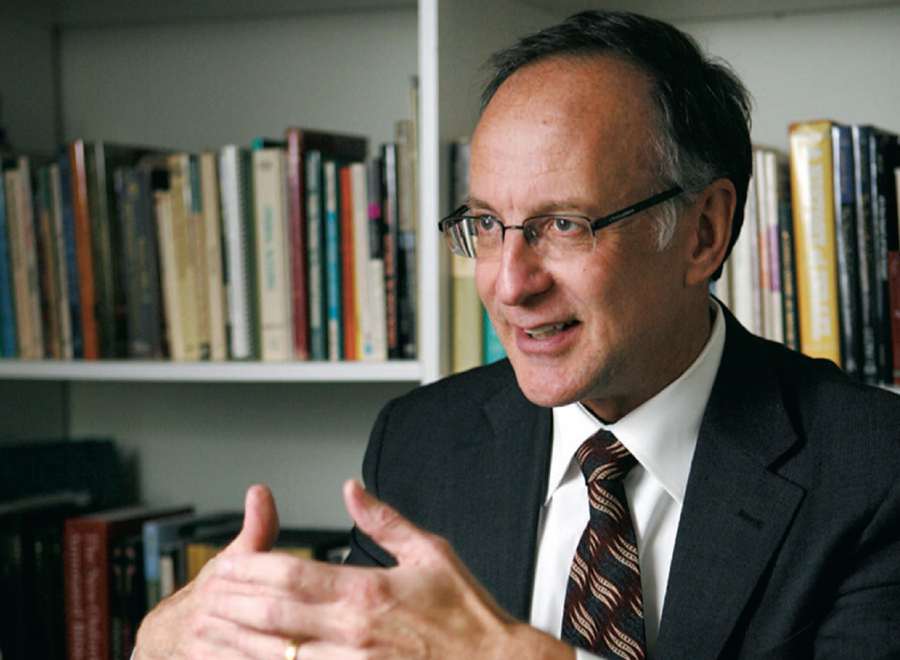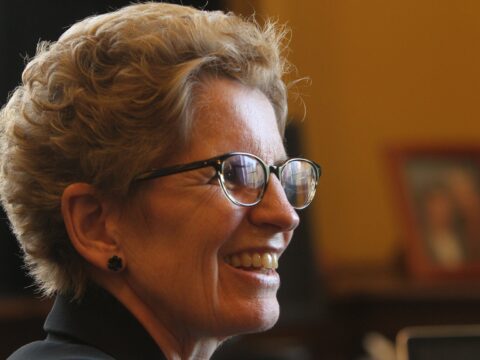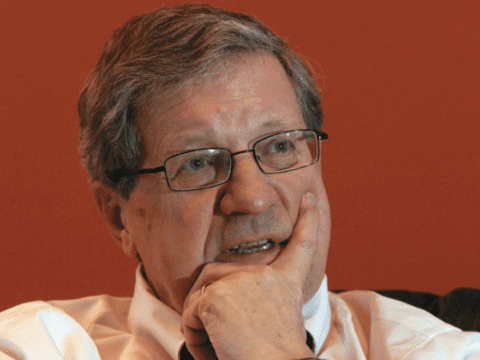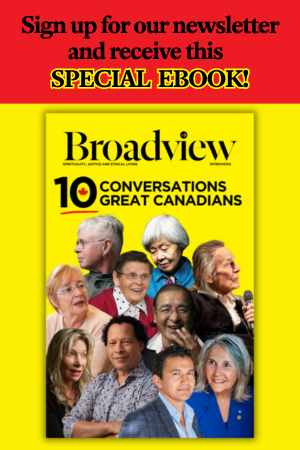Rev. Rob Oliphant picked a tumultuous time to begin his first term as an MP. He spoke to Drew Halfnight about the transition from pulpit to Parliament.
DREW HALFNIGHT: So, how’s Ottawa treating you?
ROB OLIPHANT: Well, I’ve only been in office for about 10 or 11 weeks, but it’s been quite an amazing time to be a new MP. By the end of January, I’ll have been through two throne speeches, a fiscal update, a budget, a leadership process, and we’ve just seen our leader take an earlier-than-planned exit and a new leader put in place. Yeah, it’s a pretty exciting time.
DH: Would it be fair to say you’ve taken office at the worst possible moment in Canadian history?
RO: No, I think it’s great [laughs]. Mind you, you’re going to find out that that’s my attitude about everything. Let’s be serious: we’re in a minority situation, so that makes everything very political. When you’ve got a majority, it gets more governmental. And many Canadians don’t understand that. They tend to say, “Oh, just get along. Work together!” Well, Canadians have elected a minority government, which means the children need to play well together. But really, no legislation has been passed in the House of Commons since last June, when the House rose. That’s a long time for no legislation to get done. And that’s disappointing.
DH: Obviously, your party was upset by the November fiscal update. What was your own response?
RO: I was utterly, utterly shocked at the fiscal statement. All members of Parliament, all 308 of us, were elected in good faith, and we’re expected to act in good faith. Those are my values. [Finance Minister Jim] Flaherty absolutely misled the House of Commons. Days earlier, the budgetary officer for the House indicated that there was virtually no possibility of a balanced or surplus budget this year, and Mr. Flaherty stood up and said there was. That takes great gall. Needless to say, it was a very raucous series of question periods after that. I would say there’s no trust right now.
DH: You’ve said before that the reason you got into public service was to “raise the ethical bar.” Now that you’ve arrived, how do you intend to do that?
RO: My goal will be to say what I think and to do what I say. It’s pretty simple. But I don’t think any party has a monopoly on fairness, or on good judgment, or on truth. I saw Liberals run a very bad campaign against an NDP colleague of mine. I was embarrassed about that. And I’ve seen Conservatives run campaigns like that. So it’s all around. I think I will find friends and colleagues, like-minded people in every party in Ottawa. I already have. And I’m prepared to work with them all.
DH: Canada’s cities have a serious shortage of affordable housing. Is housing on the federal agenda?
RO: No. But it’s on my agenda — high on my agenda. I was canvassing in Flemingdon [a low-income neighbourhood in Toronto], and I met a family at the door. This little 12-year-old girl came out afterward, and she said, “You know, we have 11 people living in a two-bedroom apartment, and I find it really hard to get my homework done. Do you think you can do something about that?” That’s not right.
DH: During the race for the Liberal nomination in your Toronto riding of Don Valley West, you and another Liberal contender were accused of illegally paying the fees of 500 new party members. What was it like being at the centre of a political scandal?
RO: It was a relatively modest scandal. I wasn’t personally involved in it. In the battle for a nomination, there are going to be things done and said that are going to be regretful. And I was very clear with my workers about the ethics of my campaign. Does that mean [the members’ fees] were all paid for by individuals? I’m quite convinced some weren’t, and I think that’s the case in every nomination campaign probably. But I was clear in my instructions to my campaign team.
DH: What lessons did you learn from the incident?
RO: It taught me a couple things. I have to be really clear in my instructions. I was really glad I had a paper trail of the instructions I had given my campaign team, so I could sleep at night. It also reminded me that you’re not in control in politics on so many levels. So it toughened me up a bit. Made it a little easier to get into the election because I had gotten a little stab. It was a difficult couple of days, but it wasn’t the worst thing that happened during the election.
DH: What was the worst thing you encountered?
RO: There was a group that used my being gay, my sexuality, against me during the election. Particularly, they tried to focus the Muslim community against me. This is the largest Muslim riding in the country, you know. They worked over several months to divide the Muslim community and promote a kind of homophobia that some people believe exists in the Muslim world.
DH: So how did you deal with the attacks?
RO: Well, the best part of the election was that they simply didn’t work. The Muslims in my riding saw through this, and they understood that my rights were as fragile and as important as theirs. They saw that the Charter that protects me as a sexual minority in Canada is the same Charter that protects them as a religious or ethnic minority.
DH: You’ve supported Michael Ignatieff for a long time, since before his failed 2006 bid for the Liberal leadership. Why?
RO: I think he’s got the stuff of a leader. He’s a person of huge capacity. What I look for in a leader is someone with intellect, broad experience, someone who’s listening all the time. Michael Ignatieff’s best feature that I don’t think most people know about is his curiosity. He is perhaps the most curious person I know. I find it interesting that the media always refers to him as an academic. If I had to pick his profession, I’d call him a journalist. He’s a communicator. And that’s the kind of thing I’m looking for in a leader.
DH: How do you reconcile your faith and your politics?
RO: My faith forms my politics, for sure. My faith is the motivator; it’s the reason I got into politics, why I care about housing, why I care about human rights. It’s not the what; it’s the why. But that doesn’t mean I consult my Bible on issues. I consult my constituents.
DH: Have you found that being a minister is good training for a career in politics?
RO: I don’t know how a Bay Street lawyer is prepared for this work. I’m used to people coming in the door and talking about problems. I’m used to public speaking, community gatherings. I’m used to talking about big ideas and minutiae, too. I’m used to helping facilitate people’s work — they have a dream, a vision, and they need someone to help them put it together — that’s what ministers do. We just help people identify their goals, then let them do their work.
DH: You’ve been a Liberal forever. Did you ever work with Pierre Trudeau?
RO: Oh yeah. I helped prepare for his tour of the country ahead of an election that didn’t happen in 1978. I refer to him as Mr. Trudeau.
DH: Is Mr. Trudeau an inspiration to you?
RO: Oh yes. In 1980, when I went into seminary at the Vancouver School of Theology, Mr. Trudeau wrote me a letter to say he was extremely proud that I was going into the church and might not take a career in politics. He said the church would be a very good place for me. That was a very important letter. And, hopefully, he would be proud of me now that I’m in politics, now that I sit one seat over from his son, the heart-throb of most young Canadians [laughs].
DH: You based your sermons on movies for many years. What’s in your DVD player at home right now?
RO: I just rented the whole second season of The Tudors, which I’m enjoying very much.
***
This story first appeared in The United Church Observer’s March 2009 issue with the title “‘My goal will be to say what I think and do what I say.’”












